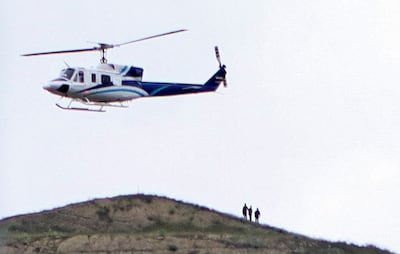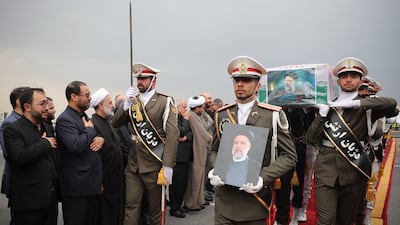As Iran investigates the helicopter crash that killed president Ebrahim Raisi, foreign minister Hossein Amirabdollahian and other government officials, a key factor has emerged: the weather.
Mr Raisi’s chief of staff, Gholam Hossein Esmaili, who was in one of the helicopters that did not crash, said on Tuesday that the weather was clear when the group departed, before conditions changed suddenly while they were in the air.
Rapidly changing weather is a notorious risk in mountain microclimates, where sudden gusts of wind or cloud movement can threaten helicopters.
According to the government-linked Tasnim news agency, there was an orange weather alert on the day of the flight, which warned that rainy and cloudy weather was approaching – potentially deadly conditions for mountain flying.
Given the risks, questions have arisen over who made the final judgment call to fly – and whether they were aware of the weather risks.
The National asked three specialists on military aviation about aviation incidents involving VIP passengers: Farzin Nadhimi, an Iran military expert at the Washington Institute for Near East Policy think tank, James Beldon, a former RAF squadron commander, and former US Air Force colonel Chris Pehrson.

According to Mr Nadhimi, the Iranian entourage could have waited until weather conditions were optimal in the mountains, or chosen to drive instead. Instead, he suggested that the Iranian President may have been eager to return to official business and forced them to fly.
“There has been this consistent problem with VIPs forcing pilots to fly in unfavourable conditions.
“They had the option of going back to Tabriz by road. There were quite a number of off-road SUVs in place that would gladly take the entourage of the President to Tabriz instead of riding in a helicopter in very unsafe conditions, bad weather. And they saw the consequence.”
Mr Beldon said sometimes people with a military background suffer from the need to “press on” to complete operations, even when that can raise risks.
“‘Press-on-itis’ has killed plenty of aviators in the past. The 1956 London Heathrow Vulcan air crash is an example of a senior VIP overruling pilots,” Mr Beldon said.
“The Air Marshall involved was Sir Harry Broadhurst – a wartime hero. He was acting as co-pilot, not the captain, of the aircraft, although his position as Commander-in-Chief of Bomber Command at the time made him vastly superior in rank to the captain.
“It is understood he wanted to press ahead because of the media impact of arriving back at Heathrow versus landing in better weather elsewhere. The Vulcan only had two ejection seats – only the pilots survived.”
Mr Pehrson said there were a range of factors that could have caused Sunday's crash, including “simply bad judgment”.
“Faulty spare parts or poor maintenance could have caused President Raisi's helicopter to crash but there are many other factors to consider,” said the former US Air Force colonel.
“These could include inclement weather, inadequate training or lack of aircrew proficiency, aircrew disorientation, or simply bad judgment on the part of the aircrew.”
Mr Pehrson pointed to the human factor, which was behind another air disaster involving US Air Force pilots flying a VIP in bad weather.
“I was stationed at Ramstein Air Base in Germany when Secretary of Commerce Ron Brown died in a plane crash near Dubrovnik, Croatia,” he said.
“The accident investigation revealed many contributing factors that resulted in that crash. The weather was bad, the approach into Dubrovnik wasn't certified by the USAF, and the aircraft didn't have adequate instrumentation to legally fly the approach.
“There was also tremendous pressure on the crew that was determined to have interfered with their judgment. Headquarters relayed to the crew to assume unnecessary risk and ‘press on’ with the mission.
“Factors like these or others could have contributed to the crash but without an accident investigation and willingness to share its findings we may never know.”


